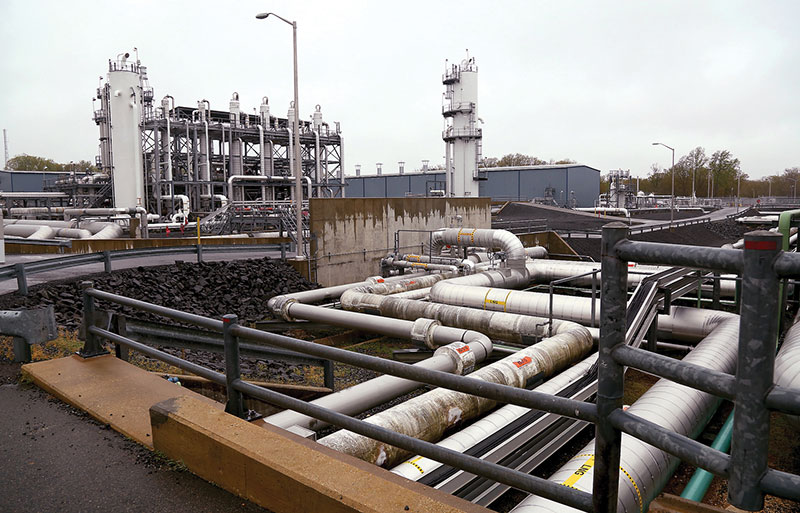Hundreds of Millions Pledged for African Carbon Credits at Inaugural Climate Summit
(Reuters) — An initiative to boost Africa's carbon credit production 19-fold by 2030 drew hundreds of millions of dollars of pledges on Monday as Kenyan President William Ruto opened the continent's first climate summit.
In one of the most anticipated deals, the United Arab Emirates (UAE) committed to buying $450 million of carbon credits from the Africa Carbon Markets Initiative (ACMI).
The ACMI was launched at Egypt's COP27 summit last year. African leaders are pushing market-based financing instruments such as carbon credits, which allow polluters to offset emissions through activities like planting trees or investing in renewable energy projects.
Organizers of the three-day summit in Nairobi say they aim to showcase Africa as a destination for climate investment rather than a victim of floods, drought and famine.
African governments see carbon credits and other market-based financing instruments as critical to mobilize funding that has been slow to arrive from rich-world donors. Africa has received only about 12% of the money it needs to cope with climate impacts, according to a report last year by the non-profit Climate Policy Initiative.
"For a very long time we have looked at this as a problem. It is time we flipped and looked at it from the other side," Ruto told delegates.
"We must see in green growth not just a climate imperative but also a fountain of multibillion-dollar economic opportunities that Africa and the world is primed to capitalize," he said.
Several speakers at the summit, however, said they had seen little progress toward accelerating climate financing.
"There hasn't been any success for an African country in attracting climate finance," said Bogolo Kenewendo, a United Nations climate adviser and former trade minister in Botswana.
Many investors still saw the continent as too risky, Bogolo said.
Kevin Kariuki, a vice president at the African Development Bank, told Reuters the deals announced on Monday were "very welcome" but did not come close to filling the climate financing hole.
He said African states would push at the COP28 later this year for the expansion of special drawing rights at the International Monetary Fund that could unlock $500 billion worth of climate finance, which could be leveraged up to five times.
More than 20 presidents and heads of government are expected to attend the summit from Tuesday. They plan to issue a declaration outlining Africa's position ahead of a U.N. climate conference later this month and the COP28, which the UAE will host.
Investments
The oil-producing UAE has been positioning itself as a climate financing leader in Africa. Emirati company Blue Carbon has been in discussions with Liberia and Tanzania to set up carbon credit trading by overseeing conservation of their natural resources.
The $450 million commitment was announced by Hassan Ghazali, a UAE climate investment official.
Climate Asset Management - a joint venture of HSBC Asset Management and Pollination, a specialist climate change investment and advisory firm - also announced a $200 million investment in projects that will produce ACMI credits.
Britain said UK-backed projects worth 49 million pounds ($62 million) would be announced over the course of the summit, and Germany announced a 60-million-euro ($65 million) debt swap with Kenya to free up money for green projects.
Many African campaigners have opposed the summit's approach to climate finance, and about 500 people marched in downtown Nairobi on Monday to protest.
They say carbon credits are a pretext for continued pollution by wealthier countries and corporations, who should instead pay their "climate debt" through direct compensation and debt relief.
Sultan Al Jaber, president of COP28, said carbon markets were an important tool to mobilize the trillions of dollars needed to confront climate change, but acknowledged that they face a "crisis of confidence".
"A lack of a commonly agreed standard is undermining their integrity and diminishing their value," he said in a speech.
A working paper released by the Debt Relief for Green and Inclusive Recovery Project found that sub-Saharan African countries face annual debt servicing costs that are nearly the same as their climate finance needs.
($1 = 0.7920 pounds)
($1 = 0.9265 euros)
Related News
Related News

- Enbridge Plans 86-Mile Pipeline Expansion, Bringing 850 Workers to Northern B.C.
- Intensity, Rainbow Energy to Build 344-Mile Gas Pipeline Across North Dakota
- Energy Transfer to Build $5.3 Billion Permian Gas Pipeline to Supply Southwest
- Enbridge Sees High Demand to Expand 593-Mile Canada-to-U.S. Gulf Oil Pipeline
- Strike Pioneers First-of-Its-Kind Pipe-in-Pipe Installation on Gulf Coast with Enbridge
- A Systematic Approach To Ensuring Pipeline Integrity
- 275-Mile Texas-to-Oklahoma Gas Pipeline Enters Open Season
- LNG Canada Start-Up Fails to Lift Gas Prices Amid Supply Glut
- Strike Pioneers First-of-Its-Kind Pipe-in-Pipe Installation on Gulf Coast with Enbridge
- Enbridge Sees High Demand to Expand 593-Mile Canada-to-U.S. Gulf Oil Pipeline





Comments